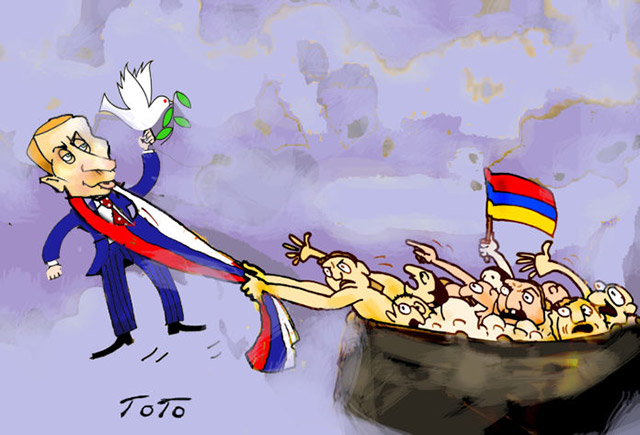The Armenian Mirror-Spectator
by Edmond Y. Azadian
For several tangible reasons, the political pendulum in Moscow is swinging back in favor of Armenia. There are many signals and political statements which need to be analyzed to chart a pattern that indicates a movement in the right direction.
Armenians who have favored and believed in Russia’s friendship for the last two centuries were beginning to get frustrated in view of Russia’s inaction in the face of existential threats in the past year.
No matter how authoritarian Russia may be, it could not fail to understand Armenia’s democratic election’s message this spring. Former President Robert Kocharyan’s sound defeat during the last election cycle was a rebuke to Russia by the Armenian populace. Kocharyan unabashedly symbolized the pro-Russian policy, and there was even talk that after an eventual Kocharyan victory, the road would be paved toward the formation of a state bringing into a federative structure Russia, Armenia and Belarus.
Read also
President Vladimir Putin, in the aftermath of the disastrous Azerbaijani victory over Armenia, had declared that any party failing to fulfill its obligations undertaken in the November 9 tripartite ceasefire declaration would be committing suicide. But as time passed, that suicide pact was relegated only to Armenia, as Azerbaijan refused to release Armenian POWs, began border conflicts with Armenia and above all, did not sign the mandate to allow Russian peacekeeping forces on its soil.
Since the November 9 ceasefire, Armenia has been under intense pressure to acquiesce to Russian demands in allowing Azerbaijan to join the Collective Security Treaty Organization (CSTO) and the Eurasian Economic Union (EEU) structures. But Ankara dampened Moscow’s hopes in ensnaring Azerbaijan within its zone of influence. Instead, Azerbaijan signed an agreement to station Turkish military base on its soil to counter Russian presence in the region and with the Shushi Declaration last month, laid the foundations of a federated state with Turkey.
While Russian Defense Minister Sergey Shoygu was bragging about the Russo-Turkish agreement in the Caucasus, Ankara was stabbing Moscow in the back by arming Ukraine with Bayraktar drones which had defeated the Russian armaments in the recent Karabakh war, while additionally joining Ukraine to help snatch Crimea from Russia’s grip.
These were the successive moves that brought to bear Russia’s frustration with the Turkish-Azerbaijani tandem.
Russia was trying to win over Azerbaijan at Armenia’s expense. However, as Russia’s frustration with Azerbaijan was building up, Europe began to court Armenia openly. The successive visits of European Union representatives to the region and the offer of 2.6 billion euros to build up Armenia’s infrastructure, along with 500 million euros allocated for the development of Syunik, the most vulnerable region of Armenia, suddenly enhanced Armenia’s strategic position for the major powers. The planned upcoming visit of French President Emmanuel Macron, with the clear intention of intensifying efforts by the Organization for Security and Cooperation in Europe (OSCE) Minsk Group to lead peace negotiations, contrary to Azerbaijan’s determination and Russia’s reluctance, created a diplomatic storm in the Caucasus. In addition to the French initiative, the foreign ministers of Romania, Lithuania and Holland visited Armenia, Georgia and Azerbaijan, demonstrating Europe’s intention to return to the Caucasus.
For a long time, on all occasions when Azerbaijan instigated a cross-border provocation, the Minsk Group co-chairs, Russia, France and the US, issued warnings to both sides, calling for restraint. However, for the first time, the European Parliament, the United States and France called for Azerbaijan to withdraw its troops.
In addition to these diplomatic moves, some symbolic actions came to play a political role. For example, US Ambassador Lynne Tracy vacationed in Syunik, which has been targeted by Azerbaijan on a regular basis recently. That was followed by Russia’s Ambassador to Armenia Sergey Kopyrkin vacationing in the Armavir region and visiting the Russian forces stationed there.
These visits were followed by that of Iranian Ambassador Abbas Badakhshan Zohouri — accompanied by the country’s military attaché Colonel Bahman Sadeghin — who declared that the Iran-Armenia border is the red line for Tehran. This announcement brought Tehran out of its equivocation in the face of the Armenian-Azerbaijani conflict. During the 44-day war, even Iran’s Supreme Spiritual Head Ali Ahmad Khamenei had praised Azerbaijan’s Islamic forces for conquering their “rightful” territory.
Soon, however, they realized their mistake: Azerbaijan’s conquered lands broadened Israel’s surveillance capacities and Turkey’s military presence in Shushi and Nakhichevan, with the avowed intention of dismembering Iran along demographic fault lines, helped them see in which camp their interests lay.
All these developments present an opportunity of which Armenia’s foreign policy establishment may take advantage.
Even before Armenia acted to reap dividends from these developments, Moscow read the handwriting on the wall and signaled a turning point in its policy. Thus, the first salvo came from Konstantin Zatulin, the head of the Eurasian Integration Committee in the Russian Parliament. He made a private visit to Armenia on August 4-5 to gauge the popular sentiment. Upon his return, he announced: “Armenia is experiencing its most difficult times. We will be betraying ourselves if we fail to help Armenia.”
That was followed by the visit of Stanislav Zas, secretary general of the CSTO. We need to remember that when Armenia had appealed to Zas a few months ago about the incursion of 1,000 Azerbaijani soldiers around Sev Lake, Zas had dismissed it as an insignificant border skirmish. This time around, Zas had a different message for Armenia’s leaders. According to him, “The current tensions fell adversely on Armenia’s security and the security situation in the CSTO zone of responsibility in general.”
Zas also stressed that “one of the CSTO’s key priorities is to ensure sovereignty and territorial integrity of its member states.”
Before meeting Prime Minister Nikol Pashinyan, Zas had met with Armenia’s new defense minister, Arshak Karapetyan, who had reprimanded him by saying, “We were waiting for you here last May.”
Incidentally, it was Karapetyan who gave the order to the Armenian forces to shoot back at the Azerbaijanis anytime they crossed the borders. Indeed, someone, somewhere had given the green light to the new minister of defense to be more assertive. Up until recently, Pashinyan’s order was not to retaliate against Azerbaijani provocations, so as not to provide a pretext to Baku to wage a new war.
For the first time, the Russian Ministry of Defense accused Azerbaijan of violating the ceasefire in Karabakh as tensions between Armenia and Azerbaijan continue to rise.
The most significant meeting took place between the ministers of defense of Armenia and Russia, Karapetyan and Shoygu. Karapetyan described the situation along the Armenian-Azerbaijani border, emphasizing the importance of Russia’s mediation. He added, “Armenia’s patience is not inexhaustible.”
The Russian minister responded that Russia is ready to assist Armenia in modernizing and reforming Armenia’s armed forces. “The Russian 102nd Military Base stationed in Armenia is well-equipped and is a guarantor for stability.”
That statement was reassuring since the Russian military base was assumed to guarantee Armenia’s borders, but it had failed to act in the past.
Mr. Shoygu presented a symbolic gift to his Armenian counterpart — a sword for Armenia to defend itself and then the two ministers reached a number of important agreements on the forthcoming cooperation.
It is already being put in place as an airlift of Russian armaments has arrived in Armenia.
Arming Armenia with modern weapons also serves Russian self-interest. As Azerbaijani leader Ilham Aliyev refuses to sign the mandate on Russian peacekeeping forces, he holds Russia hostage to be ousted any time. A formidable fighting force in Armenia equipped with state-of-the-art technology will provide a strategic alternative for Russia. The moment Aliyev disinvites the Russian peacekeepers, he might face the enhanced Armenian forces. Despite Armenia’s defeat, the country has the most competent fighting force in the region and most probably would have defeated Azerbaijan’s army one more time had the latter not been reinforced by forces from Turkey, Pakistan and Syrian jihadists and Israeli war technology.
The Armenian army carried the war in this disadvantageous situation and caused more casualties than it incurred.
At this time, all these processes are in their developing stages. The challenge for the country’s foreign policy establishment is to navigate through them skillfully and extract maximal strategic benefits for Armenia.

























































